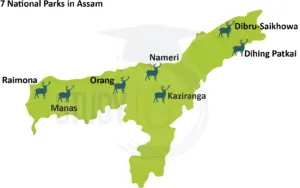Table of Contents
According to a report published in the Journal of Biological Conservation tiger population in western Assam’s Manas National Park has tripled in the last decade.
About Manas National Park
- It is located in the Himalayan foothills in Assam. It is contiguous with the Royal Manas National Park in Bhutan.
- The name of the park originated from the Manas River which flows through it. (It is a major Tributary of Brahmaputra). Beki River also flows through it.
- Manas holds the unique distinction of being a Natural World Heritage Site, Tiger Reserve, Elephant Reserve, Biosphere Reserve and an Important Bird Area (IBBA).
- Climate and Vegetation: Tropical monsoon climate; The primary forest types include semi-evergreen forests, mixed moist and dry deciduous forests, alluvial grasslands and creeper swamp forests.
- Important fauna: Asiatic elephant, tiger, greater one-horned rhino, clouded leopard, sloth bear. It also harbours endemic species like pygmy hog, hispid hare and golden langur as well as the endangered Bengal florican.

Also Read : Bannerghatta National Park
Manas National Park History
- Since 1928, Manas National Park has been a game refuge.
- In 1974, Manas has designated a tiger reserve.
- In 1985, Manas was designated a World Heritage Site.
- In 1989, it became a Biosphere Reserve.
- In 1990 Manas which has a 500 sq. km territory, was designated as a national park.
- The central region of the Chirang Ripu Elephant Reserve is also Manas.
Also Read: Sanjay Gandhi National Park
Manas National Park Geography
The imposing Bhutan hills, which serve as Bhutan’s international boundary, are located to the north of the Manas National Park. With hills covered in forests, alluvial grasslands, and tropical evergreen forests as its backdrop, the Manas River and it stretch out on either side of the mighty river. The Bhabar savannah, Terai tract, Marshlands, and Riverine tracts are the four main geological habitats formed by the monsoon and waterway system in the Park.
Manas National Park Species Found
Additionally, migratory species find refuge in Manas Park. The National Park is home to numerous animal and avian species, including 450 bird species, 55 mammal species, 50 reptile species, and 3 amphibian species. 31 of these animals are threatened species, and 21 are listed in India’s Schedule 1 of mammals.
Flora
Three main kinds of vegetation are supported by the Manas National Park’s dynamic ecosystem: semi-evergreen forests, mixed moist and dry deciduous forests, and alluvial grasslands. The dry deciduous forests in the National Park reflect an early stage in succession that is continually renewed by floods. As we progress away from water courses, moist deciduous forests take their place, which are then replaced by semi-evergreen climax forests. Due to the high soil fertility in Manas, the flora has extremely high regenerative and self-sustaining capacities.
Fauna
The Wildlife Protection Act lists more than 22 endangered species as Schedule 1 species, giving them the greatest degree of protection available in the nation. These species are protected in the Manas National Park. The Greater One-Horned Rhino, Swamp Deer, Pygmy Hog and Hispid Hare, Golden Langur, Endangered Bengal Florican, and other unique and endangered species depend on the Manas National Park for vital and sustainable habitats.
Manas National Park UPSC
Manas Park is a national park, a Project Tiger reserve, an elephant reserve, a biosphere reserve, and a UNESCO Natural World Heritage site, and it is located in Assam, India. It is adjacent to Bhutan’s Royal Manas National Park and is situated in the Himalayan Mountains. The Manas River flows through the west of the park and is the main river within it. It is a major tributary of the Brahmaputra River. Students can read all the details related to UPSC by visiting the official website of StudyIQ UPSC Online Coaching.


 Bonnet Macaques: Habitat, Features, Beha...
Bonnet Macaques: Habitat, Features, Beha...
 Periyar Tiger Reserve, Map, Flora, Fauna...
Periyar Tiger Reserve, Map, Flora, Fauna...
 Project Cheetah in India, Objectives, Ch...
Project Cheetah in India, Objectives, Ch...




















